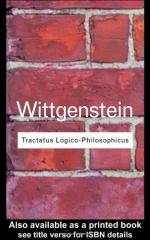|
This section contains 1,095 words (approx. 4 pages at 300 words per page) |

|
WITTGENSTEIN, LUDWIG (1889–1951), one of the most influential philosophers of the twentieth century. Born of a wealthy family in Vienna, Wittgenstein did most of his philosophical work at Cambridge, England. He became a British subject in 1938 and succeeded G. E. Moore as professor of philosophy at Cambridge in 1939. His two principal works were largely responsible for the "linguistic revolutions" in twentieth-century Anglo-American philosophy. The Tractatus Logico-Philosophicus (German edition 1921, English translation 1922, second English translation 1961), completed in the Austrian army during World War I, was the only one of Wittgenstein's books published during his lifetime. It inaugurated a logical-structuralist approach to philosophical analysis. The Philosophical Investigations (Oxford, 1953) initiated what came to be called ordinary language philosophy. Some dozen other books of lectures, notes, letters, and various manuscripts and manuscript fragments have been published posthumously; the most important is probably On Certainty (Oxford, 1969). This material, on which Wittgenstein was working...
|
This section contains 1,095 words (approx. 4 pages at 300 words per page) |

|


